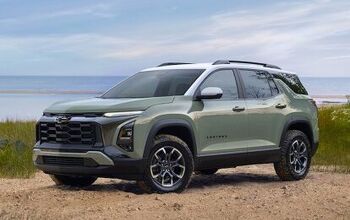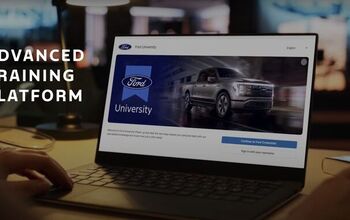The Average American is Seriously Afraid of Autonomous Cars: Study

There is something uncanny about a car that can drive itself. If you transplanted the world’s first motorists into a modern autonomous vehicle and let it lose on a track, they’d probably surmise witchcraft as the only plausible explanation and jump out in terror. Humans are innately distrustful of anything unfamiliar — it’s an important part of our survival strategy as a species. With that in mind, it isn’t surprising to hear that many Americans are a little wary of self-driving cars.
However, a recent study from the American Automobile Association suggests it might be more serious than that. The vast majority of surveyed Americans admitted to being “afraid” of riding in an autonomous vehicle while over half said they felt less safe at the prospect of sharing the road with driverless technology. This isn’t likely to be welcome news for automakers, considering that every major manufacturer is currently investing heavily into the computer and industrial sciences required to make autonomous tech possible.
“A great race towards autonomy is underway and companies are vying to introduce the first driverless cars to our roadways,” said Greg Brannon, AAA’s director of automotive engineering and industry relations. “However, while U.S. drivers are eager to buy vehicles equipped with autonomous technology, they continue to fear a fully self-driving vehicle.”
Taking a random sampling of 1,012 adults, AAA found that 78 percent of American drivers surveyed reported feelings of fear at the mere concept of being a passenger in a self-driving vehicle. Obviously, older generations were more likely to be apprehensive but even 73 percent of the 18- to 36-year-old demographic said it was a scary idea. Women were also far more likely to be afraid than men.
The responses are a little less overwhelmingly negative when participants were asked about sharing the road with computer-controlled cars. Only 54 percent of the U.S. drivers said they felt “less safe” when conceptualizing cruising beside self-driving vehicles. However, only 10 percent claimed they’d feel reassured knowing those vehicles were in the mix.
The silver lining for automakers is that most people still actively want self-driving technology as an option on future cars. While Baby Boomers and Generation X were almost fifty-fifty on the issue, 70 percent of Millennials were keen on the notion.
However, AAA performed a similar round of cold calling in 2016 that yielded almost identical figures — meaning someone needs to educate consumers on the effectiveness of emerging vehicle technologies. By and large, every study on current and future autonomous features seems to underscore added safety. Human error in the streets costs lives and not every motorist takes the same level of care to be a good driver. If the car can pick up some of the slack that a bad driver leaves behind, it probably should, but nobody will bother if they don’t trust and understand the technology.
[Image: Tesla Motors]

A staunch consumer advocate tracking industry trends and regulation. Before joining TTAC, Matt spent a decade working for marketing and research firms based in NYC. Clients included several of the world’s largest automakers, global tire brands, and aftermarket part suppliers. Dissatisfied with the corporate world and resentful of having to wear suits everyday, he pivoted to writing about cars. Since then, that man has become an ardent supporter of the right-to-repair movement, been interviewed on the auto industry by national radio broadcasts, driven more rental cars than anyone ever should, participated in amateur rallying events, and received the requisite minimum training as sanctioned by the SCCA. Handy with a wrench, Matt grew up surrounded by Detroit auto workers and managed to get a pizza delivery job before he was legally eligible. He later found himself driving box trucks through Manhattan, guaranteeing future sympathy for actual truckers. He continues to conduct research pertaining to the automotive sector as an independent contractor and has since moved back to his native Michigan, closer to where the cars are born. A contrarian, Matt claims to prefer understeer — stating that front and all-wheel drive vehicles cater best to his driving style.
More by Matt Posky
Latest Car Reviews
Read moreLatest Product Reviews
Read moreRecent Comments
- Lou_BC “We are always listening to the customer. "You sayin' the baller/gangsta types don't want Escalades on 24's that don't make vroom vroom rumbly sounds?
- AZFelix I shall fully endorse the use of autonomous cars on public roads once they have successfully completed my proposed Turing test for self driving vehicles. This test requires the successful completion of an at fault incident and accident free 24/7 driving session in Buffalo and upstate New York from October 1st until March 31st, and throughout the city of Jakarta, Indonesia for one consecutive year. Only Level 1 and Level 5 vehicles are permissible.
- Lou_BC I'd go Rav4. No Mazda dealer in my town and from what I've seen, Mazda's tend to rust.
- Steve Jacobs I've got a bright Red Kia EV6. Easy to find in a parking lot.
- MKizzy Gently used EV6's under $30K aren't hard to find and have the range and style to almost intrigue me into taking the EV plunge. However, I'll wait for a mid-sized non-luxury EV sedan or wagon which is not a tablet housing a car (Model 3) or sacrifices too much usable space for the sake of style (Ioniq 6) before I go electric. I'm not holding my breath.


































Comments
Join the conversation
The "Average American" has approximately one testicle and approximately one ovary.
The average American also believes in angels, so I don't know that I should take their input on autonomous transportation seriously.